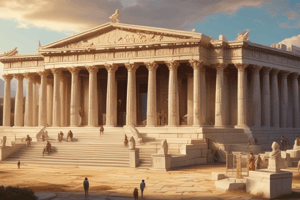Podcast
Questions and Answers
What was the primary demand of the Merchants in Ancient Athens?
What was the primary demand of the Merchants in Ancient Athens?
- Expansion of Athenian territory
- Complete eradication of the Aristocracy
- Increased military power
- More rights to political participation (correct)
What does the term 'Isonomy' refer to in the context of Athenian democracy?
What does the term 'Isonomy' refer to in the context of Athenian democracy?
- The law of majority voting
- The principle of popular sovereignty
- Equality before the law (correct)
- Equal distribution of wealth
Who was the first Great Legislator of Athens?
Who was the first Great Legislator of Athens?
- Draco (correct)
- Solon
- Pissistrates
- Cleisthenes
What significant reform did Solon implement to reduce Aristocratic power?
What significant reform did Solon implement to reduce Aristocratic power?
How did Pissistrates contribute to the cultural development of Athens?
How did Pissistrates contribute to the cultural development of Athens?
Which Great Legislator is credited with ushering in democracy in Athens?
Which Great Legislator is credited with ushering in democracy in Athens?
What led to the resurgence of the Aristocracy after the reign of Pissistrates?
What led to the resurgence of the Aristocracy after the reign of Pissistrates?
What was one outcome of Cleisthenes' reforms in Athens?
What was one outcome of Cleisthenes' reforms in Athens?
Flashcards
Athenian Democracy
Athenian Democracy
A form of democracy in ancient Athens, characterized by conflict between merchants and aristocracy, aiming for equality (isonomy) and political participation.
Isonomy
Isonomy
Ancient Athenian concept of equality before the law, stressing that equality was more important than other laws.
Great Legislator
Great Legislator
Important figures in ancient Athens who sought to resolve conflicts and establish laws, progressively weakening the aristocracy's power.
Draco
Draco
Signup and view all the flashcards
Solon
Solon
Signup and view all the flashcards
Cleisthenes
Cleisthenes
Signup and view all the flashcards
Pisistratus
Pisistratus
Signup and view all the flashcards
Political Participation
Political Participation
Signup and view all the flashcards
Study Notes
Development of Democracy in Ancient Athens
-
Conflict: Democracy emerged in Athens through decades of conflict between merchants and the aristocracy. Merchants sought greater political participation and equality.
-
Isonomy: Democracy in Athens took the form of isonomy, a system where equality superseded law. Political conflict was unsustainable, necessitating new roles like the Great Legislator.
-
Great Legislators: Several Great Legislators played key roles in shaping Athenian democracy.
-
Draco (circa 621 BCE): First to codify Athenian laws, weakening the aristocracy's power by establishing written rules.
-
Solon (594 BCE): Further weakened the aristocracy by abolishing debt slavery, dividing citizens into property-based classes, and promoting specialization and financial opportunity.
-
Pisistratus: A tyrant who promoted Athenian culture, but whose successors' tyranny led to conflict and Spartan intervention, temporarily reversing democratic progress.
-
Cleisthenes: Most significantly, Cleisthenes permanently established democracy in Athens by expanding citizenship to the poor, creating opportunities for participation and introducing isonomy (equality before the law) via property-independent citizenship.
-
Democratic Progress: The reforms instituted by these individuals gradually shifted power from the aristocracy towards broader political participation, leading to the eventual flourishing of Athenian Democracy with a strong focus on equality.
Studying That Suits You
Use AI to generate personalized quizzes and flashcards to suit your learning preferences.
Description
Explore the significant shifts in governance that led to the establishment of democracy in Ancient Athens. Learn about the key figures, including Draco and Solon, whose reforms paved the way for political equality amidst conflicts between different social classes. This quiz will test your knowledge on the evolution of political systems in ancient history.



